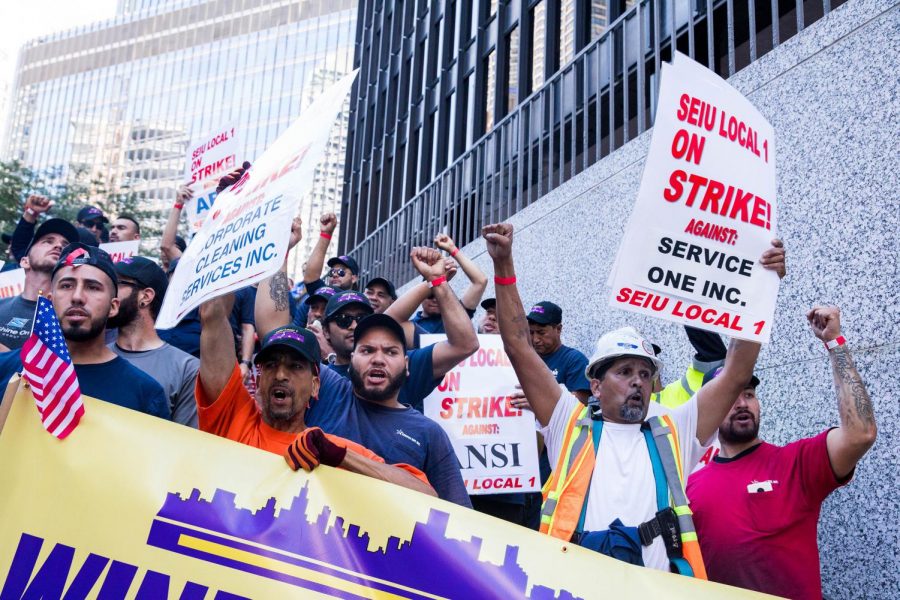Janus’ decision didn’t kill labor unions
Photo courtesy of Tribune News Service
Window washers chant during a march in Chicago on July 2. Workers demanded better insurance and higher pay for window-washing services.
Oct 25, 2018
Early this past summer, the Supreme Court gave unions what appeared to be a death blow. In Janus v. American Federation of State, County and Municipal Employees, the court overturned the existing requirement that public sector workers pay dues to unions, arguing the mandate is a violation of their right to free speech. In a country where unions have been on the decline since 1983, the decision was expected to be the beginning of the end. But after seeing the sudden spate of successful labor strikes in Illinois over the past few months, there is a reason to be optimistic about the future of unions in the U.S.
Last summer’s window washer strike in Chicago made shockwaves in the labor community. In July, the people who climb into rickety hanging structures to clean the city’s tallest skyscrapers stopped work to protest for a higher wage and a bolstered life insurance policy. At the end of the strike, the workers gained a whopping 27-percent wage increase and their life insurance policy doubled from $50,000 to $100,000.
The workers in this case, admittedly, were not public sector workers. Most worked for private contracting companies employed by the buildings they washed. But the union most of the workers belong to, Service Employees International Union Local 1, represents both private and public workers. The fact its members were able to successfully strike for an extended period of time — and an overwhelming percentage of striking workers approved the results of the ensuing negotiation — is a beacon of hope to unions, public and private, nationwide.
A mere two months after the window washers’ strike, hotel workers in Chicago also stopped work to advocate for higher wages and year-round health insurance coverage. Many hotel workers are considered seasonal workers and are unemployed during off months. For many of them, those off months are dangerous, especially when their life insurance ends with their work. Workers had difficulty gaining access to necessary medications, faced strenuous working conditions and were often paid minimum.
At its peak, the strike affected 26 different hotels in downtown Chicago, which is one of the biggest tourism markets in the country. Workers at multiple hotel chains gained what was lauded a “competitive wage” by Michael D’Angelo, Hyatt’s labor relations Vice president. Most importantly, workers won a guarantee of year-round, consistent health care coverage.
Get The Daily Illini in your inbox!
The hotel workers, like the window washers, are also private sector workers. They belong to Unite Here Local 1, a union that represents over 15,000 hospitality workers in the Chicagoland and northwest Indiana. But despite the fact Janus pertains only to public sector workers, both of these strikes are good signs for the labor movement. They show that, despite discouraging trends over the last few decades, union organization is still effective.
We here at the University saw the reality of this up close and personal last spring during the Graduate Employees’ Organization strike. While some students grumbled about the noise disturbances during classes and exams, graduate workers launched a historic effort to afford better access to health care, tuition waivers and more. The strike ended before Janus was decided but was still a remarkable show of support for what was undeniably the underdog in the labor fight.
There is reason to be concerned about the American labor movement these days. Union membership, even before Janus, has been declining for years. However, Janus does not have to be the end of unions many thought it would be. It’s a chance for union leadership to evolve and grow to accommodate new needs like the protections of undocumented workers and more fervent efforts for health care plans. But the stakes are high. Under an administration that seems bent on undermining unions’ bargaining power, this is a pivotal moment during which unions need to prioritize augmenting and retaining membership, or else face the reality of losing bargaining power altogether.
Kyra is a sophomore in LAS.






